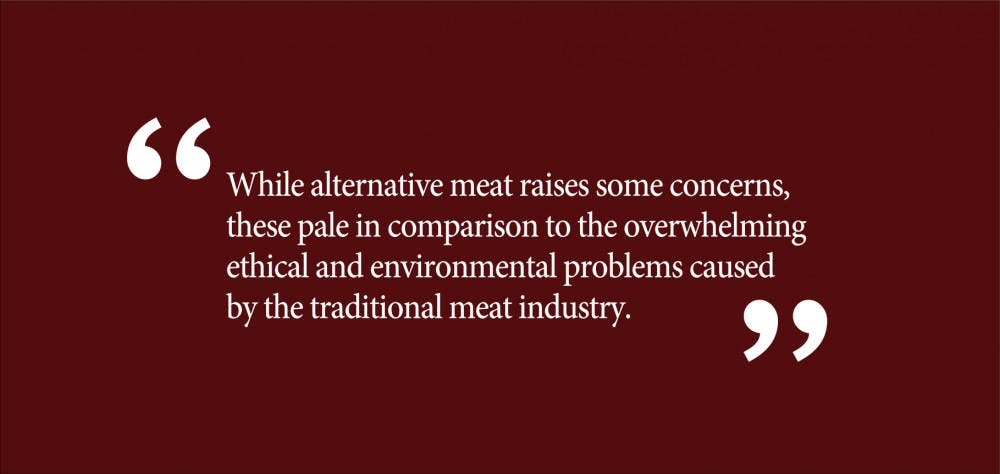Burger King has recently made headlines — as well as literal lines outside their stores — with their Impossible Whopper, which consists of a plant-based patty that tastes and “bleeds” like real meat. It was recently reported that this new burger fueled Burger King’s best quarter of growth in four years. The company behind the Impossible Whopper’s plant patty, Impossible Foods, along with another plant-based meat patty business, Beyond Meat, have helped popularize meat alternatives. These plant-based meats have emerged as a true competitor to the meat industry.
But plant-based alternatives come with real problems. Predictably, the price of alternative meat remains high. A 12-oz block of Beyond Meat is around four times more expensive than your standard ground beef, which typically costs $3 a pound.
Perhaps more alarming are the health concerns: A Harvard review found that both Impossible and Beyond patties are highly processed, have a high saturated fat content and four times the sodium of a standard ground beef patty. In addition, heme, the ingredient that gives these patties flavor and makes the Impossible burger “bleed,” contains compounds known as isoflavones that have been linked to cancer and hormonal changes.
That brings us to what is perhaps the real future of meat alternatives: Lab-grown meat. Though the phrase immediately brings up images of mush that tries to pass off as meat, “laboratory meat” is no longer the butt of the joke. This past Monday, a group of Harvard scientists, led by Dr. Luke MacQueen, published research that showed how they had made meat in a lab that looks and tastes like real meat by growing animal muscle cells on a gelatin scaffold. There are challenges here too, especially those relating to scale. The world has a ravenous appetite for meat, and there is currently no way that the production of laboratory-made meat can keep up. In addition, the stereotype associated with “lab meat” is hard to remove, and both regulators and the public are still wary of it, even if it is technically the same thing as the meat from an actual animal. Dr. MacQueen hopes that, “refining this technique and others like it could help more people, including serious carnivores, consider lab-grown meat as a sustainable, ethical alternative to meat raised for slaughter.”
Despite the challenges that alternative meat still face, the industry is quickly growing — and the traditional meat producers are beginning to notice. Nearly 30 states are currently debating bills backed by cattlemen’s associations, that would prohibit non-traditional meat from being called “meat.” This suggests that even the proponents of “real” meat are starting to realize that there is no doubt that the meat industry is going to change, because it has to change.
While alternative meat raises some concerns, these pale in comparison to the overwhelming ethical and environmental problems caused by the traditional meat industry. Chickens have been genetically modified to produce as much meat as possible, so much so that some can no longer breathe or walk. We mindlessly slaughter nearly 70 billion chickens, pigs, turkeys and cows each year to satisfy our carnivorous tastes. In addition, the World Health Organization has pointed to red meat as a Group 1 carcinogen, a group that includes cigarette smoke and asbestos, although there has been a slew of contradictory research in recent years.
And if the health and ethical arguments don’t win out against your stomach, maybe the environmental one will — over 14 percent of the world’s greenhouse gas emissions come from animal agriculture, according to the United Nations. A study led by Dr. Joseph Poore at the University of Oxford showed that without meat or dairy consumption, global farmland use could be reduced to a quarter of what it is now and still feed the world. Poore also found that the most sustainable meat products are still much more environmentally damaging than the least environmentally friendly vegetable.
“A vegan diet is probably the single biggest way to reduce your impact on planet Earth, not just greenhouse gases, but global acidification, eutrophication, land use and water use,” according to Poore. “It is far bigger than cutting down on your flights or buying an electric car.” In other words, even if the meat you eat isn’t killing you, it is quite literally killing both billions of animals and the Earth itself. Luckily, for those of us who still like a good steak or a plate of hot wings, our options are not limited to veganism.
I gave up meat after watching a documentary about its environmental impacts in high school. I have never regretted my choice, but I don’t expect everyone else to do the same. It is natural for people to not want something to get taken away from them, especially something as central to many diets as meat. But I urge you to consider the alternatives. Yes, they have problems, some of them bigger than others. But the current model of the meat industry is neither ethical nor sustainable, and both plant-based and lab-grown meat are pointing us toward healthier futures.
Bliss Han ’23 can be reached at bliss_han@brown.edu. Please send responses to this opinion to letters@browndailyherald.com and op-eds to opinions@browndailyherald.com.





